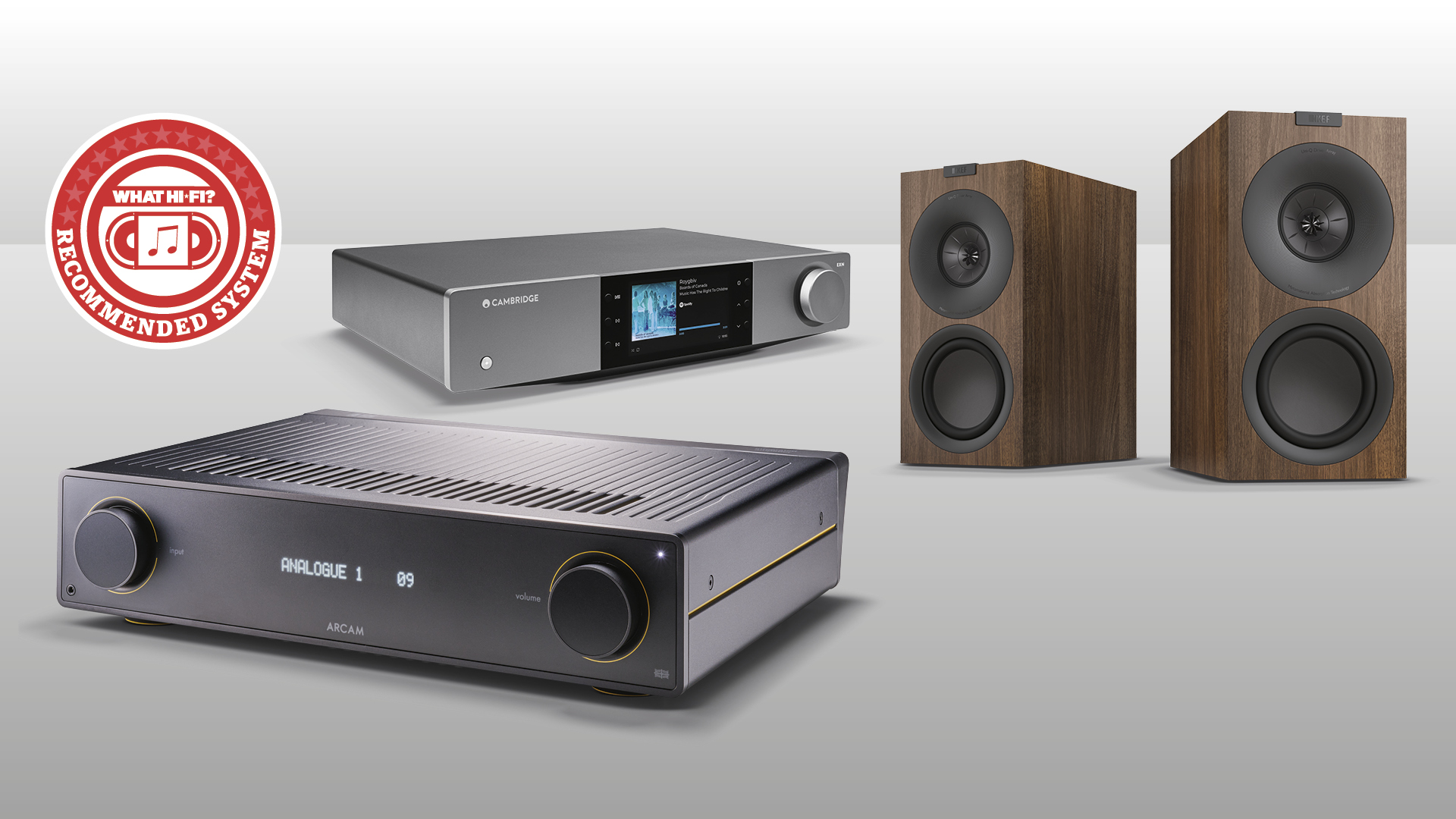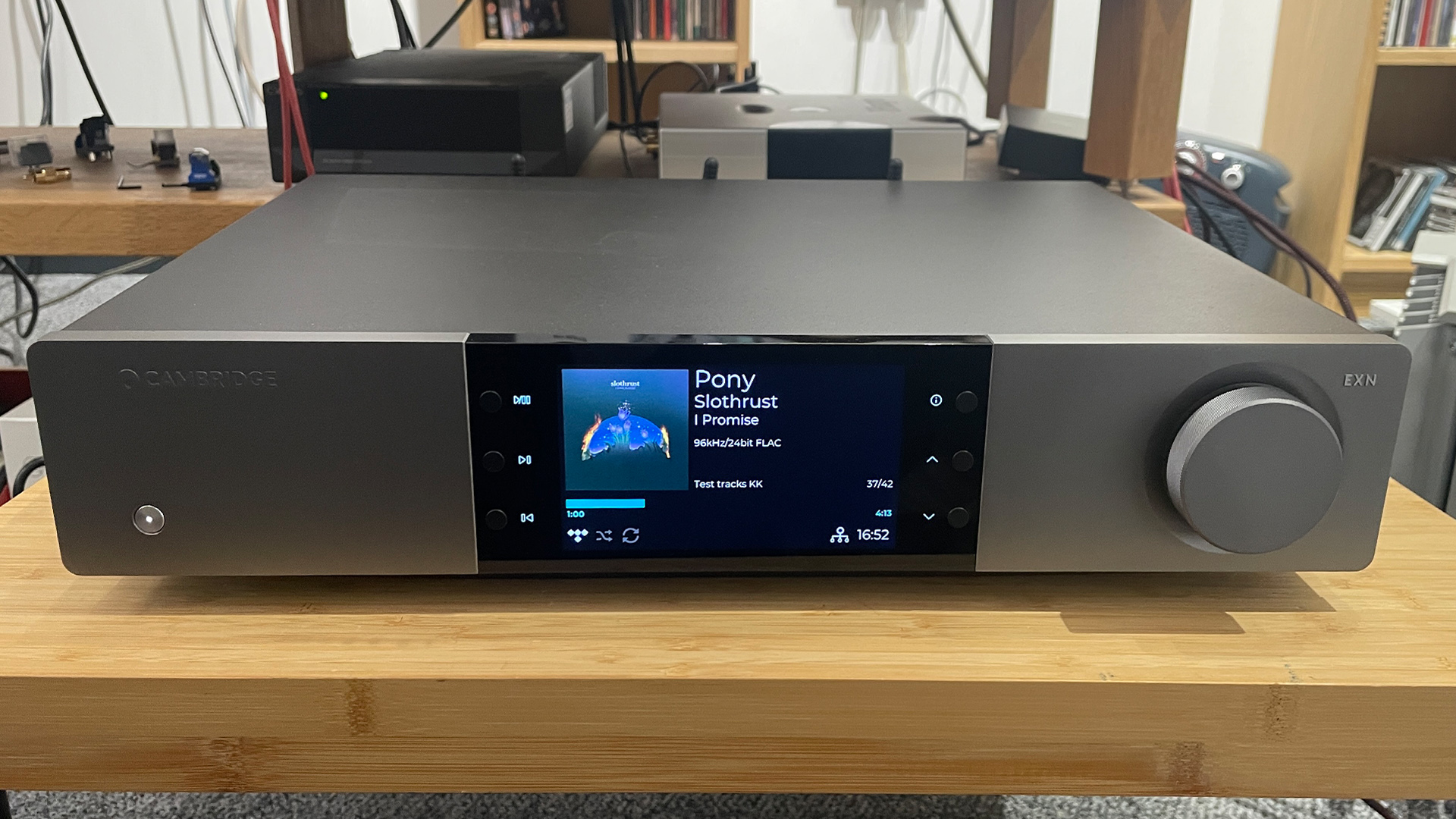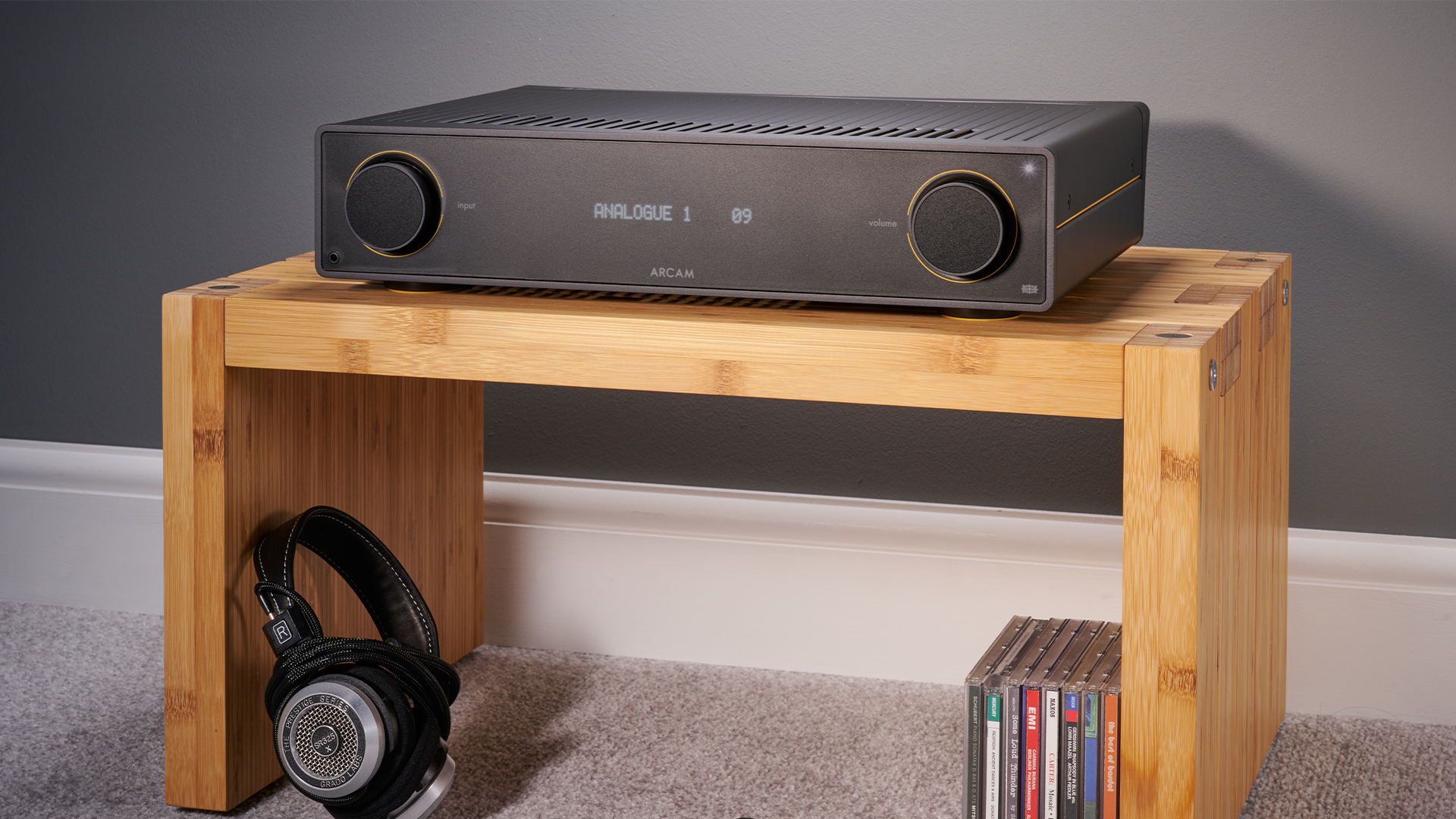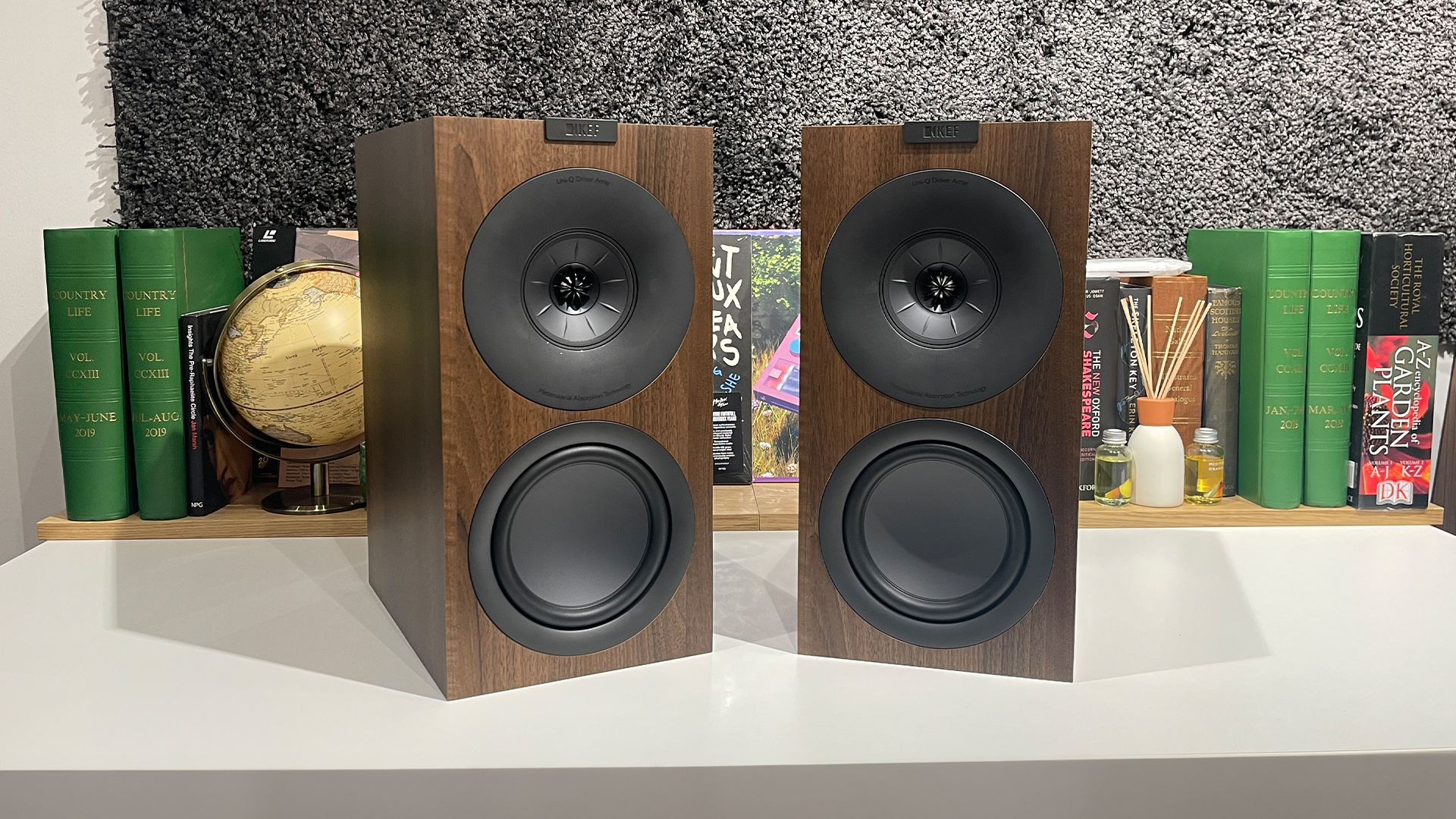We've built a gold-standard hi-fi system that delivers sweet streams aplenty – and looks good, too
Cambridge's latest music streamer sits at its heart

The fact that the more entry-level streaming system we built just before Christmas features a Cambridge Audio unit doing the digital music duties and our step-up system relies on a different streamer further up the brand’s chain should tell you all you really need to know about Cambridge’s excellence in the streaming field.
The British brand's new EX100N is the ideal foundation from which to build a modern mid-range system packed with contemporary convenience and benchmark performance, and here we have paired it with equally talented partnering equipment from Arcam and KEF.
Together, they form an utterly handsome and talented setup for anyone wishing to stream to their heart's content without sacrificing sound quality. Add a turntable, perhaps, at a later date and you have an all-round set-up that will do you proud for many years to come.
The system
- Music streamer: Cambridge Audio EXN100 (£1599 / $1799 / AU$2999)
- Amplifier: Arcam A15 (£1099 / $999 / AU$1995)
- Speakers: KEF Q Concerto Meta (£1099 / $1299 / AU$2000)
- Total price: £3797 / $4097 / AU$6994
Cambridge Audio EXN100

Part of that top performance is down to Cambridge’s proprietary streaming platform, StreamMagic. It is controlled via an easy-to-use app, and we don’t have any issues with playing tracks in many different formats from many different sources.
In terms of file formats supported, the Cambridge EXN100 can handle high-resolution audio files up to 32-bit/784kHz PCM and DSD512, and MQA files. All the relevant sampling rate and file format information can be seen on screen and in the app, for those curious about their music library.
One interesting and useful addition is the inclusion of an HDMI eARC input; this means, of course, that you can hook it up directly to a TV to use this set-up to relay your TV’s sound. Don’t discount that option: clearly you won’t be getting Dolby Atmos functionality from stereo speakers, but the improvement in the sound you will hear will be exponential.
The EXN100 impresses us with a sound that is clear, spacious and balanced. There is a controlled sense of rhythm, attack and drive, but also enough fluidity to the music to make this an easy listen. There is no flab and there’s ample punch, and enough body to the sound that music never comes across as thin but also not overly warm; it simply sounds well balanced.
Get the What Hi-Fi? Newsletter
The latest hi-fi, home cinema and tech news, reviews, buying advice and deals, direct to your inbox.
As we say in the full review, “the streamer delivers spry, composed and room-filling sound. Voices are clearly defined with natural tones and nuances brought to the fore.
“Feed it high-quality tracks and it will perform at its best, but the streamer doesn’t penalise you for playing lower MP3-quality radio stations or Bluetooth streams in the slightest.”
The best praise we can really give the EXN100 is that, if you do want a greater dose of dynamic subtlety and verve, you have to pay a significant amount more for the genuine next step up in performance, the Naim ND5 XS 2 and Audiolab 9000N.
Arcam A15

However good the streamer might be, however, the system as a whole won’t sound good if the parts don’t complement each other. The choice of amplification, therefore, is vital. Which is why we have included the Arcam A15 in this set-up. A two-time Award winner now, the A15 is an absolute bull’s-eye, delivering great clarity, scale and precision while at the same time offering just about as much in the way of features as the modern hi-fi listener could wish for.
The A15 is a wonderfully commanding and controlled performer. It excels in terms of grip and composure, while allowing the drama in the music shine through.
As we say in the review, while listening to Tchaikovsky’s 1812 Overture: “We are impressed by the scale of the sound and the way this still compact design deals with the music’s savage dynamics. There is no shortage of punch and power, but this is no muscle-bound thug. This Arcam is insightful, tracking the music’s multitude of instrumental strands with skill. Dynamic nuances are conveyed with finesse and we love the way it renders instrumental textures with such delicacy.”
Importantly for this system, in terms of dynamics and clarity the digital module matches some of the better affordable DACs that come our way – which is pretty high praise: a stand-alone unit is almost always more capable than a module included in another piece of equipment. Its Bluetooth abilities also are easily good enough for casual listening – pretty much all you can ask for from a medium that is never as good as a wired connection.
While we aren’t using them in this current set-up, it’s good to note that the A15’s phono stage and headphone output are really rather good. Both these circuits tend to be tick-box exercises for most manufacturers, but that’s not the case here. The phono circuit is decently quiet and has enough gain to work well with a wide range of moving magnet cartridges (and most high-output moving coils). Similarly, the headphone output retains the same informative and engaging character we hear from our speakers. So, as and when you want to upgrade your system, the Arcam A15 is ready and waiting for the call.
KEF Q Concerto Meta

The third part of this triumphant trio came in too late to be considered for an Award this year – so we shall have to wait a while to see if the KEF Q Concerto Meta take a gong in 2025. They are, though, certainly up for consideration as it stands.
The Q Concerto Meta is a true three-way design. Its Uni-Q driver array packs a 10cm aluminium midrange, a 19mm vented aluminium dome tweeter and KEF’s Metamaterial Absorption Technology. It is the first time the Q series has featured MAT. This technology takes the form of a highly complex maze-like structure that sits behind the tweeter dome and is made up of multiple channels that are each tuned to absorb a specific frequency. When the channels are combined, KEF claims that MAT absorbs 99 per cent of the unwanted high-frequency sound. Impressive.
And, from our experience of hearing Meta-equipped speakers across the KEF ranges, the technology works impressively well. So well, in fact, that MAT won What Hi-Fi?’s Innovation of the Year Award in 2020.
The in-house comparison with the Award-winning LS50 Meta is interesting. At £1000 / $1499 / AU$2495, the LS50 Meta are close enough to be considered direct rivals. Listen to them side by side and the right choice becomes a matter of taste.
Where the three-way Concerto takes the plaudits is when it comes to low-end muscle and definition. There is so much more authority, grip and scale to music than the smaller LS50 Meta can deliver. The Concerto Meta sounds more comfortable at higher volume levels too. The older model counters with greater insight, refinement and naturalness from the midrange upwards, so it would be worth trying the two to see which pair is more appropriate for your needs.
Whatever the comparison with its smaller sibling, by general class standards, the Q Concerto Meta is superbly balanced. As we say in our review, “these speakers have a smooth tonality that still delivers enough bite to satisfy. You could feed them a diet of White Stripes and Nirvana and never feel short-changed in terms of attitude. Yet, play a grand classical piece such as Tchaikovsky’s Marché Slave Op.31 and they deliver the swelling dynamic shifts and mass of instrumentation with enviable control and composure.”
That all-round ability and control make the Q Concerto Meta an ideal complement to the electronics in this system. For a thoroughly modern two-channel streaming system we struggle to think of a better option at the price.
MORE:
How to build the perfect hi-fi system
Our buying guides of the best speakers, best amplifiers and best music streamers you can buy

Jonathan Evans is the editor of What Hi-Fi? magazine, and has been with the title for 18 years or so. He has been a journalist for more than three decades now, working on a variety of technology and motoring titles, including Stuff, Autocar and Jaguar. With his background in sub-editing and magazine production, he likes nothing more than a discussion on the finer points of grammar. And golf.
-
dbonini82 Reply
Love to see these system suggestions as planning to build my own in the future at some point when money (and my wife) allows. Would be helpful to see what cables are recommended as well as this seems to be an important (and not inexpensive) piece that would give a complete picture.What Hi-Fi? said:Together, this trio form an utterly handsome and talented setup for anyone wishing to stream to their heart's content without sacrificing sound quality.
We've built a gold-standard hi-fi system that delivers sweet streams aplenty – and looks good, too : Read more -
manicm Replydbonini82 said:Love to see these system suggestions as planning to build my own in the future at some point when money (and my wife) allows. Would be helpful to see what cables are recommended as well as this seems to be an important (and not inexpensive) piece that would give a complete picture.
At this level cables are unimportant. Having said that I get affordable Audioquest cabling for peace of mind. But the rest is just nonsense. -
Carlitos A few days ago this article was with PMC Prodigy 1 Speakers. Why was it changed now to the KEF?Reply -
bobbobson1234 Reply
Accusation of payola and profanity deleted by moderation.Carlitos said:A few days ago this article was with PMC Prodigy 1 Speakers. Why was it changed now to the KEF? -
GSV Ethics Gradient Reply
Please read the forum rules. You are not permitted to swear and you are not permitted to make accusations of payola without evidence.bobbobson1234 said:Accusation of payola and profanity deleted by moderation.
